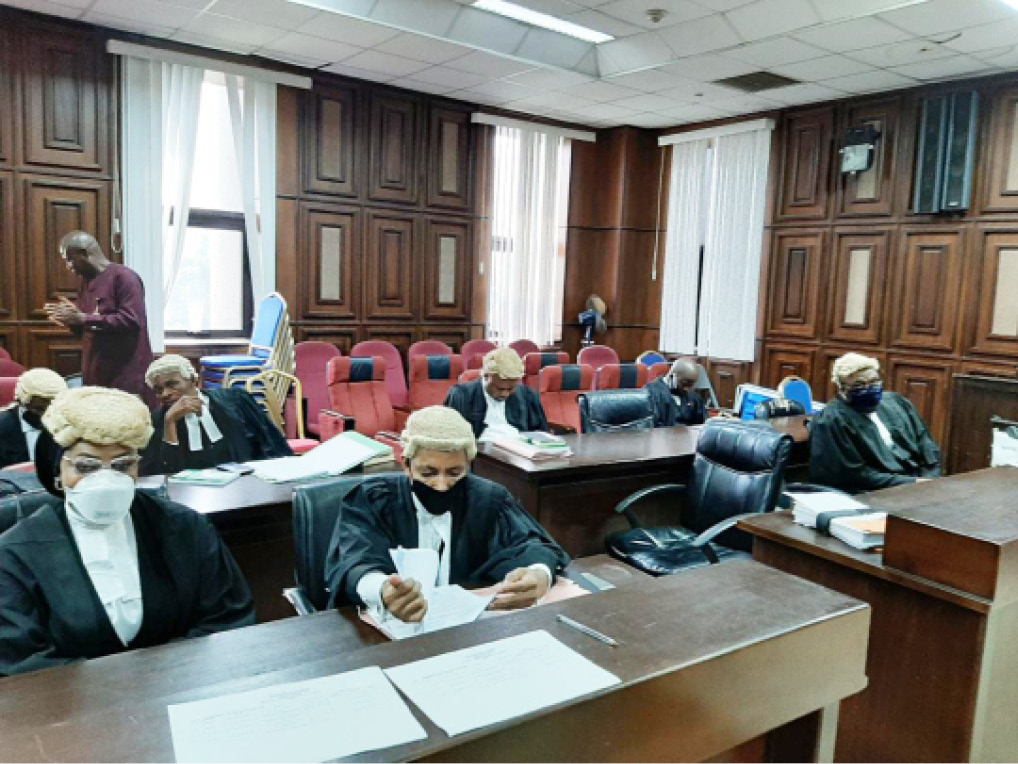Litigants in various courts have continued to bemoan the delay of their cases occasioned by the COVID-19 pandemic in the country.
Many of the litigants, who have cases at the various courts in Nigeria, blame it on the already congested court docket and the effects of the COVID-19 pandemic.
The President of Amex Staff Farmers MPCS Ltd, Owerri, Dr Alex Onoyona, regretted that the cooperative’s case in court, which was at the stage of execution of judgment, and which was to be reassigned to another judge, was delayed due to the COVID-19 induced absence of junior staff of the courts, who had to stay home on account of the pandemic.
“As a cooperative society whose small loans’ business is time-bound, it has been frustrating waiting and waiting for the courts to reopen for our case to be determined,” he said.
“Our monies are inadvertently held in escrow technically. Idle cash is not producing yet for us it is attracting costs for our case,” he added.
Similarly, Hope Nathan and his two co-defendants, have been detained at the Correctional Centre in Keffi since their arraignment; they would have had their cases concluded but for the COVID-19 pandemic.
The death of the presiding judge in the matter, Justice Jude Okeke, has further added to the delay of their case.
Also, Prince Izuchukwu is disappointed in his case against the National Union of Road Transport Workers (NURTW) at the National Industrial Court which is yet to set a date for hearing as a result of the pandemic.
The COVID-19 has infected 56,256 persons with 44,152 reported to have recovered and 1,082 dead, leaving about 11,022 active cases as of September 14.
Within the same period, reports indicate that Lagos leads the infection rate with 18,611 cases while 15,245 recovered and 204 died with 3,162 active cases.
The FCT has the second-highest infections with 5,447 cases out of which 1,664 recovered while 74 died, leaving 3,709 active cases.
The National Judicial Council (NJC) had on May 7 announced guidelines for the use of technology for the speedy dispensation of justice in the country during the period of COVID-19 pandemic.
In a statement by the Chief Justice of Nigeria (CJN), Justice Tanko Muhammad, the council approved virtual sittings for all Heads of Court using collaborative platforms such as MS365, Zoom, Google Meetings and other tools with electronic recording functionality.
In the guideline titled, ‘National Judicial Council COVID-19 Policy Report: Guidelines for Court Sittings and Related Matters In the COVID-19 Period’, the NJC also said social media channels shall be used to live-stream court proceedings to the public while the court shall publish on a weekly basis the matters that would be heard remotely for that week.
“Physical sittings by courts in courtrooms should be avoided as much as possible during this COVID-19 period. Such physical court sittings must be limited only to time bound, extremely urgent and essential matters that may not be heard by the court remotely or virtually,” he said.
“Heads of courts have the responsibility for determining the matters that fall within these set boundaries and publish the list thereof for the information of judicial officers, litigants, counsel and members of the public. Such list may be reviewed by the head of the court from time to time as necessary and required.”
It also approved face masks, social distancing measures and temperature tests in the court premises.
Despite these measures, however, only few cases have been heard and concluded using ICT within the period of the pandemic.
Many cases have continued more on a face to face basis. Also, a number of enforcement of court orders have been conducted by the police attached to the court.
Speaking on how to deal with such delays in court, Paul Ananaba (SAN) said heads of courts should provide practice directions of their own which would aim to focus on speedy disposal of the very many cases which have now accumulated due to the COVID-19.
“Any frivolous applications or actions, the court should not allow it; the cost should be heavy,” he said.
Speaking on the means by which the delays can be reduced, E.M.D. Umukoro Esq listed among others that: The magistrates, justices and lawyers, as well as litigants, must brace up and be serious with their cases, and to ensure matters are dispensed within the time frame allotted to them.
“For example, all motions can be dispensed with once the parties have filed their respective briefs or written addresses. Parties can adopt and no time for adumbrations.
“For matters already at the hearing stage, the parties should state the number of their witnesses and should be allotted time within which to start and close their cases while cross-examination should be limited to relevant questions tied to the evidence of the witnesses.
“In view of the above, fast tract practice direction should be made by the various chief judges to guide the court users as to the need to dispense off their cases within the time allotted them.
“More judges and magistrates should be appointed or if possible, tribunals should be established where some senior lawyers can be appointed to aid the adjudication process.
“Day to day or week to week adjournment only for cogent reasons should be granted. With all hands on deck these cases can be reduced if not totally dispensed with.”

 Join Daily Trust WhatsApp Community For Quick Access To News and Happenings Around You.
Join Daily Trust WhatsApp Community For Quick Access To News and Happenings Around You.


